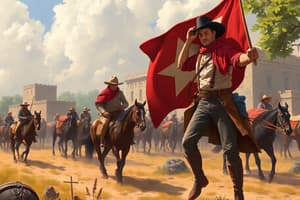Podcast
Questions and Answers
What did Mexico's military government impose on American settlers in Texas in the 1830s?
What did Mexico's military government impose on American settlers in Texas in the 1830s?
- Voting rights
- New restrictions on slavery (correct)
- Land ownership rights
- Tax exemptions
What was the outcome of the settlers' night-time victory in Texas?
What was the outcome of the settlers' night-time victory in Texas?
It caused the Mexican government to withdraw its expeditionary force.
What platform did President Polk run on in 1844?
What platform did President Polk run on in 1844?
- Opposition to slavery
- Manifest destiny (correct)
- Universal healthcare
- Strict immigration controls
Which territories did President Polk add during his presidency?
Which territories did President Polk add during his presidency?
What act required state and local officials to assist in the capture of escaped slaves?
What act required state and local officials to assist in the capture of escaped slaves?
What did the 'Wilmot Proviso' aim to do?
What did the 'Wilmot Proviso' aim to do?
What led to rapid settlement in California after its annexation?
What led to rapid settlement in California after its annexation?
Match the following events with their outcomes:
Match the following events with their outcomes:
Flashcards are hidden until you start studying
Study Notes
Texas
- In the 1830s, Mexico's military government restricted slavery in Texas, causing tension with American settlers.
- The Texan settlers faced two significant defeats, including the infamous Battle of the Alamo, but later achieved a decisive night victory.
- The Mexican government withdrew its forces, leaving Texas in a state of self-governance for ten years.
Mexico
- President James K. Polk, aligned with Jacksonian Democratic ideals, won the 1844 election promoting manifest destiny and territorial expansion.
- He successfully acquired Texas, the Oregon territory, and extensive Mexican lands extending to the Pacific.
- Critics, including notable figures like Abraham Lincoln and Frederick Douglass, condemned Polk’s actions as an "imperial war for slavery."
California
- The discovery of gold in California after its annexation in 1848 fueled the idea of manifest destiny and significant American migration.
- Approximately 250,000 Americans settled in California along with 45,000 Chinese immigrants by 1852.
- State and local militias waged brutal campaigns against Native Americans, leading to a drastic decline in the indigenous population and significant land seizures.
A Compromise
- The acquisition of new lands from Mexico reignited slavery debates, particularly regarding Western territories following Texas.
- The Wilmot Proviso proposed a complete ban on slavery in the new territories but was ultimately defeated.
- In 1850, a compromise was reached which designated California as a free state while leaving other regions to decide through popular sovereignty.
Fugitive Slaves
- The 1850 compromise included a stricter Fugitive Slave Act requiring state and local officials to capture escaped slaves, with rewards for success.
- Penalties were enforced on citizens assisting fugitive slaves, intensifying Northern opposition.
- This legislation prompted anger among Northerners and sympathy for escaping slaves, exemplified by Frederick Douglass and the novel "Uncle Tom's Cabin."
Kansas & Scott
- Following the 1850 compromises, slavery supporters sought more territory, pushing for popular sovereignty in the Kansas-Nebraska region in 1854.
- The Supreme Court's decision in the 1857 Dred Scott case declared that Congress had no authority to ban slavery in federal territories and asserted that African Americans could not be U.S. citizens, whether free or enslaved.
Studying That Suits You
Use AI to generate personalized quizzes and flashcards to suit your learning preferences.




